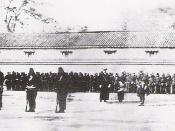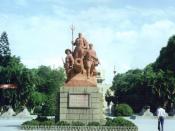Japan decided to modernise due to a number of factors including domestic problems under the shogunate rule, the fact she was nervous of foreign threats after China's defeat by Britain in the First Opium War which made Japan aware of Western strength, Japan's isolation from the Western world had ended after she submitted to foreign demands and signed treaties in 1854. These factors allowed the Meiji Restoration to occur, where the political revolution overthrew the military shogunate government in January 1868. Japan realized that they would have to introduce western ideas and methods to ensure they would put themselves in a strong enough position to resist foreign pressure and not have to accept unwanted trade and regulations as China had been forced to. The Japanese government acknowledged European strength, especially Britain, in doing so foreign experts were brought to Japan to instruct on western methods including education, railways, banking and law and training was sought for her army and navy.
Japan wanted to modernise her society, economy, technology, warfare techniques, education, banking, transport and legal systems, improve industry, to unify and westernize its government and open up trade options. This was very successful in the fifty-year period from 1854 to 1904 but not all changes were positive to the Japanese peasants.
Prior to 1868 domestic problems had been experienced because agriculture had become commercialised, industrialization had commenced, and trade among regions had grown enabling rising household incomes, which impacted by creating many social changes. Previously a class structure had been imposed but with a healthy commercial economy a class of wealthy commoners was produced, this challenged the social and political dominance of the shogunate rule. There had also been bad weather and poor harvests followed by severe famines and this led to peasant uprisings and urban riots. All of these...


